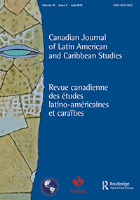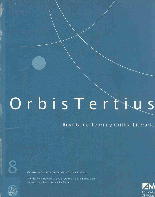
E-Latina-Revista Electronica de Estudios Latinoamericanos
Scope & Guideline
Exploring Latin America's Rich Tapestry of Culture and Society
Introduction
Aims and Scopes
- Interdisciplinary Analysis of Latin American Societies:
The journal publishes works that draw from various academic disciplines, including sociology, political science, history, and cultural studies, providing a comprehensive understanding of Latin American contexts. - Focus on Social Movements and Political Change:
A significant emphasis is placed on the study of social movements, revolutions, and political transformations within Latin America, highlighting the region's dynamic political landscape. - Impact of Historical Contexts on Contemporary Issues:
The journal explores how historical events and legacies shape present-day challenges in Latin America, providing critical insights into the socio-political fabric of the region. - Critical Engagement with Marginalized Narratives:
There is a consistent focus on marginalized voices, including indigenous populations, Afro-descendants, and other minority groups, aiming to amplify these perspectives in academic discourse. - Examination of Economic and Environmental Issues:
The journal addresses economic policies and environmental concerns, particularly how they relate to social justice and human rights within the Latin American context.
Trending and Emerging
- Critical Examination of Populism:
There is a growing focus on the phenomenon of populism in Latin America, analyzing its implications for democracy, governance, and social movements. This trend is crucial as populism continues to shape political realities in the region. - Intersections of Gender and Politics:
Emerging themes increasingly highlight the role of gender in political movements and societal changes, reflecting a broader commitment to understanding intersectionality within Latin American contexts. - Environmental Justice and Activism:
Recent publications emphasize environmental issues, particularly the intersection of environmental justice with indigenous rights and activism. This theme is increasingly relevant as climate change impacts and ecological crises become more pronounced. - Migration and Transnationalism:
There is heightened attention to migration patterns and transnational identities, exploring how these dynamics affect social, economic, and cultural landscapes in Latin America and beyond. - Revisiting Historical Trauma and Memory:
The journal is increasingly publishing works that examine historical traumas and collective memory, particularly in relation to authoritarian regimes and their legacies, which resonate with current human rights discourses.
Declining or Waning
- Traditional Economic Models:
There is a waning interest in traditional economic analyses that do not incorporate contemporary socio-political contexts. Recent publications favor more integrated approaches that consider the social implications of economic policies. - Classical Historical Narratives:
The journal has shifted away from purely classical historical narratives, moving towards more nuanced interpretations that include diverse voices and experiences, thus traditional historical accounts are less frequently addressed. - Static Political Analyses:
Analyses that do not account for the evolving nature of political landscapes or fail to engage with emerging political movements are becoming less common, as the journal emphasizes dynamic and adaptive political discourse.
Similar Journals

Universum-Revista de Humanidades y Ciencias Sociales
Navigating the Frontiers of Humanities and Social SciencesUniversum - Revista de Humanidades y Ciencias Sociales is a pivotal academic journal published by UNIV TALCA, INST ESTUDIOS HUMANISTICOS JUAN IGNACIO MOLINA in Chile, dedicated to advancing scholarly discourse in the fields of humanities and social sciences. With an Open Access model implemented since 1986, the journal facilitates widespread access to research outputs, enabling greater engagement from researchers, students, and professionals alike. As of 2023, Universum holds a Q2 classification in the Arts and Humanities and a Q3 classification in Social Sciences, showcasing its commitment to excellence in scholarly contributions. The journal ranks #74/173 in General Arts and Humanities and #212/275 in General Social Sciences within Scopus, reflecting its impact and relevance in these disciplines. With a publication scope converging from 2008 to 2024, Universum is an essential resource for those seeking to explore innovative ideas and the latest research trends in the human and social sciences.

Canadian Journal American and Caribbean Studies
Exploring the Dynamics of American and Caribbean Relations.Welcome to the Canadian Journal of American and Caribbean Studies, a pivotal platform for researchers, professionals, and students interested in the intricate relationships and dynamics of the American and Caribbean regions. Published by Routledge Journals, Taylor & Francis Ltd., this journal presents a rich tapestry of scholarly articles that explore various dimensions of political, geographical, and developmental studies. With a history spanning from 1984 to 2011 and resuming in 2014 through 2024, it continues to contribute to the field's scholarly discourse. The journal currently ranks in the Q4 quartile for Development and Geography, Planning and Development, and Q3 for Political Science and International Relations, underscoring its emerging relevance within these domains. While it is not open access, the journal provides a vital resource for advancing research and fostering academic dialogue among its audience. Explore cutting-edge insights and critical analyses that reflect the evolving landscapes of American and Caribbean studies.

Revista Estudos Politicos
Cultivating Scholarly Dialogue on Global IssuesRevista Estudos Politicos, published by Universidade Federal Fluminense, serves as a premier platform dedicated to the exploration of political studies in contemporary contexts. Focusing on an interdisciplinary approach, this journal aims to foster scholarly discourse and research in political science, public policy, and international relations, reflecting the dynamic nature of political practices in Brazil and beyond. Although the journal is currently not open access, it plays a crucial role in advancing knowledge and critical analysis, encouraging submissions from researchers, professionals, and students seeking to contribute to political discourse. With an ISSN of 2177-2851, the journal aspires to establish itself as a vital resource in the field, promoting a nuanced understanding of the intricacies of political systems and society. By engaging with current themes and challenges, Revista Estudos Politicos is poised to be an essential reference for those looking to deepen their understanding of political phenomena.

Espacio Abierto
Unlocking New Perspectives on Latin American SocietiesEspacio Abierto, with ISSN 1315-0006, is a distinguished academic journal published by the Universidad del Zulia and Consejo de Desarrollo Científico y Humanístico, dedicated to fostering interdisciplinary research and dialogue within the fields of social sciences and humanities. Nestled in the vibrant city of Maracaibo, Venezuela, this journal provides a valuable platform for scholars to disseminate their findings and contribute to critical discussions on social, cultural, and scientific issues affecting Latin American societies. While specific metrics such as the impact factor and h-index are still in development, Espacio Abierto aims to enrich scholarly literature with accessible and insightful content that enhances academic inquiry and professional practice. By welcoming contributions from researchers, professionals, and students alike, it aspires to be an essential resource for those seeking to advance knowledge and engage with contemporary challenges.

ArtCultura-Revista de Historia Cultura e Arte
Fostering Interdisciplinary Dialogue through Open Access Research.ArtCultura-Revista de História Cultura e Arte, published by Universidade Federal de Uberlândia, is a leading peer-reviewed journal in the fields of cultural, historical, and artistic studies. With its commitment to Open Access publishing since 2007, the journal provides an invaluable platform for researchers, professionals, and students to disseminate and access high-quality research without financial barriers. The journal's dedication to scholarly excellence is reflected in its robust editorial process and diverse range of articles that delve into the intricate connections between art and culture, promoting interdisciplinary dialogue and global perspectives. Situated in Brazil, ArtCultura plays a pivotal role in enhancing the visibility of Latin American contributions to these vital fields, thereby fostering academic collaboration and cultural understanding. We invite you to explore the rich tapestry of ideas and insights published in our journal, located at AV PARA, 1720 CAMPUS UMUARAMA, UBERLANDIA 38400-902, BRAZIL.

Orbis Tertius
Innovative Insights for a Global AudienceOrbis Tertius is an esteemed academic journal published by the National University of La Plata, Faculty of Humanities and Educational Sciences, dedicated to the multifaceted fields of humanities, social sciences, and educational research. Since its inception in 1996, this Open Access journal has been committed to facilitating the dissemination of scholarly work that fosters critical thinking and dialogue amongst researchers and practitioners from diverse backgrounds. With a focus on innovative methodologies and interdisciplinary approaches, Orbis Tertius serves as a platform for high-quality research that enriches our understanding of complex societal issues. The journal’s accessibility ensures that valuable insights are available to a global audience, making it a vital resource for academics, students, and professionals striving for excellence in their respective fields. Located in La Plata, Argentina, it invites contributions that reflect the dynamic nature of contemporary humanities and educational practices.

Foro Internacional
Bridging Borders with Academic ExcellenceForo Internacional is a distinguished academic journal published by the COLEGIO MEXICO, A C, DEPT PUBLICACIONES. Since its inception in 1960, this Open Access journal has served as a vital platform for scholarly discourse in the field of international studies, fostering critical analysis and understanding of global dynamics. With a commitment to disseminating high-quality research, Foro Internacional provides researchers, professionals, and students with access to a wealth of knowledge that addresses contemporary issues from a Latin American perspective. While specific impact factors and Scopus rankings are yet to be disclosed, the journal's legacy and ongoing contributions to academia underscore its relevance and importance. The journal is based in Mexico City, enriching the academic landscape and promoting cross-border collaboration in scholarly activities.

LATIN AMERICAN THEATRE REVIEW
Connecting Tradition and Innovation in Latin American TheatreLATIN AMERICAN THEATRE REVIEW, published by the University of Kansas, serves as a vital scholarly resource in the field of theatre studies, specifically focusing on the rich tapestry of Latin American theatrical works and their cultural significance. With an ISSN of 0023-8813 and an E-ISSN of 2161-0576, this journal is committed to disseminating innovative and critical insights that facilitate the understanding of contemporary and historical performance arts in Latin America. Despite its Q4 ranking in the Visual Arts and Performing Arts category, it plays an important role in bridging gaps within academic literature, particularly from 2002 to 2024, by attracting contributions from researchers and practitioners alike. While the journal does not currently offer an open access model, it is highly regarded as a platform for both established and emerging scholars. The LATIN AMERICAN THEATRE REVIEW not only emphasizes the importance of theatrical practices but also enriches broader discussions on cultural identity and social issues within Latin America, making it an essential read for anyone passionate about the performing arts.

HISTORIA MEXICANA
Navigating the Intricacies of Latin American HistoryHISTORIA MEXICANA is a prestigious academic journal published by the COLEGIO DE MEXICO CENTRO DE ESTUDIOS HISTORICOS that has been an open access resource since its inception in 1967. With an ISSN of 0185-0172 and an E-ISSN of 2448-6531, the journal serves as a vital platform for scholars dedicated to the exploration of historical studies, particularly focusing on Mexico and its broader context within Latin American history. As a testament to its scholarly impact, HISTORIA MEXICANA is ranked in the Q3 category in History according to the 2023 metrics and holds a Scopus rank of #582 out of 1760 in Arts and Humanities. This journal not only fosters rigorous academic discourse but also provides a unique repository of knowledge, bridging gaps in historical research and inspiring future studies in the field. Researchers, professionals, and students alike will find this journal an invaluable resource for deepening their understanding of Mexico's rich and complex past.

Trashumante-Revista Americana de Historia Social
Exploring the Rich Tapestry of Social HistoryTrashumante-Revista Americana de Historia Social is a pivotal scholarly journal published by UNIV ANTIOQUIA that has been advancing the field of social history since its transition to an open access format in 2013. Operating from Colombia, this journal has established a considerable reputation within the academic community, achieving a Q2 ranking in History and a Q4 ranking in Social Sciences (Miscellaneous) as of 2023. With an emphasis on interdisciplinary research, it aims to foster scholarly dialogue by covering diverse aspects of social history, including cultural, political, and economic dimensions across the Americas. Researchers, professionals, and students are encouraged to access its wealth of knowledge, as it is freely available to audiences worldwide, reflecting the journal's commitment to improving accessibility and fostering academic discourse. With Scopus rankings positioning it in the 43rd percentile for History and 15th percentile for General Social Sciences, Trashumante remains an essential resource for those dedicated to exploring and understanding the intricate tapestry of social historical narratives.